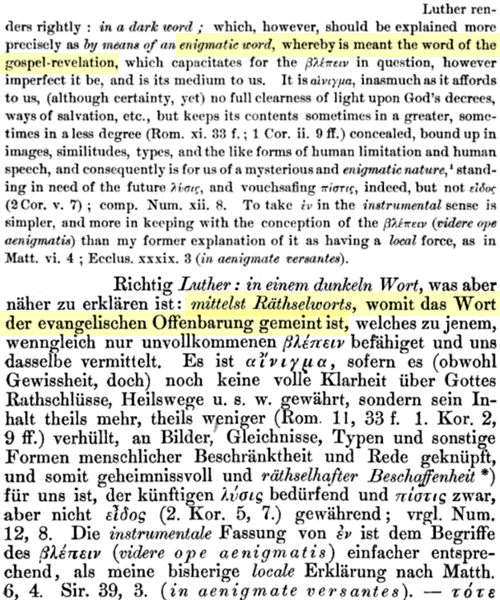If we accept that the apostle Paul is referring to a mirror in 1 Cor 13:12, then what is being reflected?
The apostle Paul (as well as other Christians) behold the mirror and see the glory of the Lord.
Exegesis
The Greek text of 1 Cor. 13:12 states,
ΙΒʹ βλέπομεν γὰρ ἄρτι δι᾽ ἐσόπτρου ἐν αἰνίγματι τότε δὲ πρόσωπον πρὸς πρόσωπον ἄρτι γινώσκω ἐκ μέρους τότε δὲ ἐπιγνώσομαι καθὼς καὶ ἐπεγνώσθην TR, 1550
While the apostle Paul uses the Greek noun ἔσοπτρον in 1 Cor. 13:12, he uses the synonymous κάτοπτρον in 2 Cor. 3:18 by means of the verb κατοπτρίζω.
In A Dictionary of Greek and Roman Antiquities,1 William Smith groups the nouns κάτοπτρον, ἔσοπτρον, ἔνοπτρον all under the same heading of "speculum," i.e. mirror.

Thus, we may discover more of the meaning of 1 Cor. 13:12 by examining the similar passage in 2 Cor. 3:18, wherein it is written,
18 But we all, with unveiled face beholding the glory of the Lord through a mirror, are transformed into the same image from glory to glory, even as by the Spirit of the Lord.
ΙΗʹ ἡμεῖς δὲ πάντες ἀνακεκαλυμμένῳ προσώπῳ τὴν δόξαν κυρίου κατοπτριζόμενοι τὴν αὐτὴν εἰκόνα μεταμορφούμεθα ἀπὸ δόξης εἰς δόξαν καθάπερ ἀπὸ κυρίου πνεύματος TR, 1550
In 2 Cor. 3:18, the Christian with unveiled face beholds the glory of the Lord Jesus Christ through a mirror since he is transformed into that same glorious image by the Holy Spirit (the Spirit of the Son and the Father). Rom. 8:29 reiterates this when the apostle Paul writes that Christians are to be conformed to the image of the Lord Jesus Christ.2
This conformation to the image of the Lord Jesus Christ is progressive, not immediate. Thus, in 1 Cor. 13:12, the apostle Paul uses the word now (ἄρτι) to describe how the the immature (ἀτελής) Christian presently beholds himself "through a mirror" (δι᾽ ἐσόπτρου)3 "by a dark saying" (ἐν αἰνίγματι). In doing so, he only sees an obscure image of the Lord Jesus Christ, because the transformation is not yet complete; hence, the Christian is not yet mature (τέλειος).
By «ἐν αἰνίγματι», the apostle Paul evidently alludes to Num. 12:8 wherein it is written,
8 I shall speak to him mouth-to-mouth, by appearance and not by enigmatic sayings, and he saw the glory of the Lord. Wherefore then were you not afraid to speak against My servant Moses?
Ηʹ στόμα κατὰ στόμα λαλήσω αὐτῷ ἐν εἴδει καὶ οὐ δ αἰνιγμάτων καὶ τὴν δόξαν κυρίου εἶδεν καὶ διὰ τί οὐκ ἐφοβήθητε καταλαλῆσαι κατὰ τοῦ θεράποντός μου Μωυσῆ LXX
Moses saw the glory of the Lord because the Lord(=Yahveh) did not speak to him by enigmatic sayings (δ αἰνιγμάτων), but rather, mouth-to-mouth or face-to-face. On the other hand, our sight of the glory of the Lord is obscured because the Lord has spoken to us by an enigmatic saying (ἐν αἰνίγματι). What this αἴνιγμα is, Heinrich August Wilhelm Meyer explains:4

The immature Christian "knows in part" and "prophesies in part,"5 but the apostle Paul states that a time will come, which he indicates by the word "then" (τότε), when the Christian will fully mature and that partial knowledge and prophesying will be done away with.6 He uses the analogy of a child maturing into an adult as proof that one day the immature Christian (i.e., babe in Christ) will likewise mature and put away childish things.7 But, that time has not come, for the apostle Paul states that we "now behold through a mirror by a dark saying"8 but in the future ("then"), we shall behold the Lord and his glory face-to-face, just as Moses beheld Yahveh and his glory face-to-face.
τότε δὲ ἐπιγνώσομαι καθὼς καὶ ἐπεγνώσθην
This Greek phrase may be translated as,
But then I shall know just as I was also known.
The former verb ἐπιγνώσομαι is conjugated in the future tense, and the latter verb ἐπεγνώσθην is conjugated in the aorist tense. The former conjugation in the future tense refers to the future time, «τότε» ("then"), when the Christian has reached maturity (τελειότης). At that time, the Christian shall fully know God. The latter verb in the aorist tense refers to the present time, ἄρτι ("now"), which time period spans antecedently to the time of Christian conversion. During this time of immaturity and imperfectness (ἀτέλεια), the Christian is known by God9 although his own knowledge of God is incomplete. In the future, the Christian shall know God - completely - just as he is also known by God - completely.
Footnotes
1 p. 1052-1053
2 Rom. 8:29: «συμμόρφους τῆς εἰκόνος τοῦ υἱοῦ αὐτοῦ»
3 Regarding the phrase «δι᾽ ἐσόπτρου», Heinrich August Wilhelm Meyer commented, "through a mirror; popular mode of expression according to the optical appearance, inasmuch, namely, as what is seen in the mirror appears to stand behind it."
4 English, p. 307; German, p. 371
5 1 Cor. 13:9
6 1 Cor. 13:10
7 1 Cor. 13:11
8 1 Cor. 13:12
9 1 Cor. 8:3: «εἰ δέ τις ἀγαπᾷ τὸν θεόν οὗτος ἔγνωσται ὑπ᾽ αὐτοῦ», "But if someone loves God, this [man] is known by Him." cp. Gal. 4:9
Vocabulary
- τελειότης (teleiotēs) = (n.) completeness; perfectness (perfection); maturity
- τέλειος (teleios) = (adj.) complete; perfect; mature
- ἀτέλεια (ateleia) = (n.) incompleteness; imperfectness (imperfection); immaturity
- ἀτελής (atelēs) = (adj.) incomplete; imperfect; immature
References
Meyer, Heinrich August Wilhelm. Critical and Exegetical Handbook to the Epistles to the Corinthians. Trans. Bannerman, David Douglas. Ed. Dickson, William P. New York: Funk, 1884.
Meyer, Heinrich August Wilhelm. Kritisch exegetischer Kommentar über das Neue Testament, Fünfte Abtheilung, Kritisch exegetisches Handbuch über den ersten Brief an die Korinther. 5th ed. Vol. 5. Göttingen: Vandenboeck and Ruprecht, 1870.
Smith, William. A Dictionary of Greek and Roman Antiquities. 2nd ed. Boston: Little, 1859.

